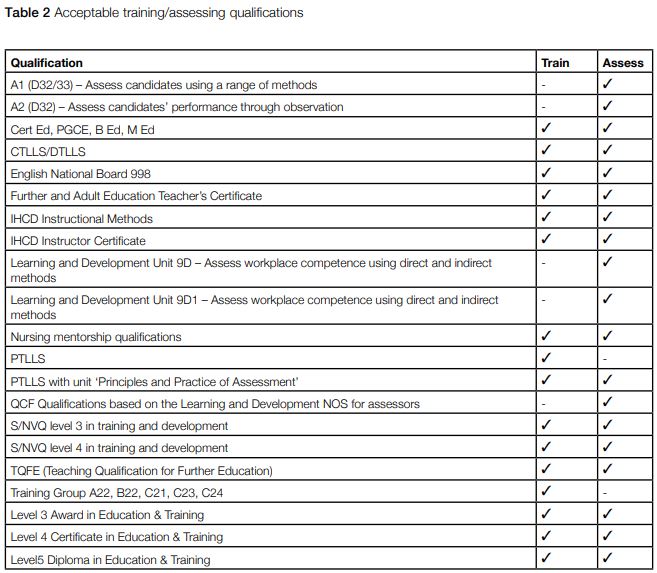Thanks to the Health and Safety Executive (HSE) deregulating First Aid Training in 2013 the barriers to entry are pretty low. Whether that is good or bad is debatable. It does make it easier to set up as a Trainer – it certainly made it easier for me when I returned to teaching First Aid, but on the other hand it does allow trainers whose standards can be, shall we say, somewhat dubious, without all the checks and balances.
Those that can, do. Those that cannot, teach. Those that cannot teach, teach teachers.
Hmmm…..
Here are the minimum qualifications that you need:
A teaching qualification at Level 3 or higher.
An assessing qualification at Level 3 or higher
Occupational competency in the subject.
That’s it, qualification-wise. Obviously you need equipment, clients and a way of certifying but I cover that elsewhere. This post is about your qualification.
Teaching and assessing
These two often go hand in hand. Pre 2013 you could just hold a teaching qualification and you would need a separate person to assess your learners at the end of the course. You still need someone to assess, however the requirement for it to be a separate person is no longer there and you can assess as well as teach. It makes sense, therefore, that if you are starting from scratch that you look at gaining a qualification that covers teaching and assessing.
GEIS3 from the HSE includes a list of recognised teaching and/or assessing qualifications

The most common route for those without any qualifications is the Level 3 Award in Education and Training. It takes about a week and will qualify you for teaching and assessing and it is widely recognised. There are many ‘train the trainer’ providers out there that can get you through this qualificaton. See our list of some of them here.
Occupational competency
You need Occupational competency to be able to deliver First Aid training. As a minimum this could be the 3-day First Aid at Work course (FAW). Some Certifying / Awarding Organisations allow this to be a springboard to teaching a range of qualifications, however many will need to you get additional training. For instance, to teach Paediatric First Aid you may need a Paediatric First Aid qualification as well, since the FAW does not cover paediatric topics. Note the following:
- The FAW needs to be renewed every three years so that you remain competent. Additional qualifications often only need taking once to give you a lifetime of competence.
- A FAW qualification will allow you to teach FAW. Some subjects may require you to be qualified to the level above. For instance, Awarding Organisation QNUK will allow you to teach Outdoor First Aid with an Outdoor First Aid qualification, whereas ITC First will only allow you to teach it if you hold an Advanced Outdoor First Aid qualification.
- Make sure that your FAW qualification is a Regulated qualification if you wish to work through an Awarding Organisation (AO). Because of the difficulty ensuring that non-Regulated courses meet the required standards, AOs often insist on a Regulated Certificate as it is easier for them to accept.
- Most Awarding Organisations also need Annual evidence of Continuing Professional Development (CPD). It is not onerous – about 6 hours a year, but it demonstrates that you are keeping your skills up and expanding your knowledge. It could be as simple as taking an online course or attending a seminar.
Real life skills
As you can see from the above, you don’t actually need any real-life experience to become a First Aid trainer – the FAW is a qualification based on simulated casualties. In practice (and I appreciate that it is a generalisation) you tend to be a better trainer if you have some real-world experience – such as being an Event First Aider, or with a (military) medical background.
Some people with medical backgrounds don’t make very good teachers (they are not effective at communicating or their higher level of experience makes it hard to teach basic First Aid principles) and there are also very good communicators with minimal ‘real life’ experience. So yes, in some ways it is a sweeping generalisation but usually you will be a better Trainer with actual medical experience. If you have none, spend some time as a First Aider or a Community Responder. It will help you deliver your courses more effectively.
